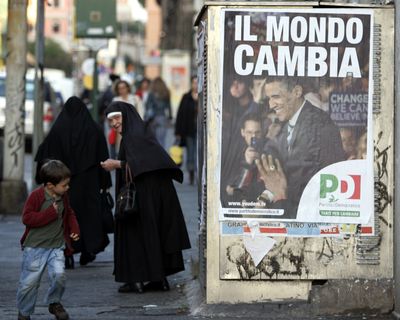World reacts with elation to Obama’s victory
Most see new beginning in global politics

LONDON – If history records a sudden surge in carbon emissions on Nov. 5, 2008, it may be due to the collective exhalation of relief and joy by the hundreds of millions – perhaps billions – of people around the globe who watched, waited and prayed for Barack Obama to be elected president of the United States.
In country after country, elation at Obama’s win was palpable, the hunger for a change of American leadership as strong outside the United States as within it. And there was wonderment that, in the world’s most powerful democracy, a man with African roots and the middle name Hussein, an upstart fighter who took on political heavyweights, could go on to capture the highest office in the land.
Suddenly, Americans accustomed to being criticized for speaking hyperbolically about their country found plenty of others doing it for them.
“The new world,” the Times of London declared on its front page, beneath a huge, smiling portrait of Obama.
“One giant leap for mankind,” echoed the Sun, another British newspaper.
From the beginning, this race mesmerized observers far beyond U.S. shores. Two wars and two terms under President Bush left many around the world angry and spent.
Although many have denounced U.S. power and unilateralism, some seemed intent on putting the country back on a pedestal as a source of admiration and aspiration, and they fixed on Obama as their hope. Polls consistently showed that, if the rest of the world could have voted in the U.S. election, the Illinois Democrat would have won not just by a landslide, but an avalanche.
So as results came tumbling in on radios, TV screens and cell phones, many outside the United States saw it as their moment as much as America’s, and Obama’s victory as their own.
“A lot of people told me they had tears in their eyes last night. I was one of them,” Randa Habib, a Jordanian writer and political analyst, said Wednesday. “I saw his speech. I was very moved. This is a lesson to us all, that blacks and whites in America can have such a shameful past between them, yet they come together and learn how to live together.”
The Middle East, she said, has always wanted to look to the United States as a beacon, despite differences over the Arab-Israeli conflict, the Iraq war and other issues.
“There’s a feeling of hope that things will be right in America,” Habib said. “Obama can make you once again respect the U.S. for its values and democracy and all those things we had forgotten about over the last eight years.”
No one yet knows what Obama’s foreign policy will look like, and the celebratory mood over his win in many places was tempered by questions about his plans for U.S. troops in Iraq, his role in Middle East peace talks and his commitment to free trade, among other issues.
But such doubts aside, legions of jubilant supporters set off firecrackers in El Salvador, danced in Liberia and drank shots in Japan. Good wishes went streaming Obama-ward from housewives in Indonesia, the world’s most populous Muslim nation, where Obama spent some of his early childhood, and from Brazilian President Luiz Inacio Lula da Silva, who also beat long odds to lead his country.
“Your victory has demonstrated that no person anywhere in the world should not dare to dream of wanting to change the world for a better place,” said one letter addressed simply to “Senator Barack Obama, Chicago.”
Its author: Nelson Mandela, the first black president of South Africa, writing to the first black president-to-be of the United States. Africa has embraced Obama as something of a native son, although it was his father who was born in Kenya, not Obama himself.
Those inspired by Obama’s origins and accomplishments include French political activist Patrick Lozes, the son of an immigrant from the African nation of Benin.
“This election is going to improve the image the U.S.A. has in our neighborhoods,” Lozes said of France’s heavily Muslim working-class enclaves. “The American dream comes back to life.”